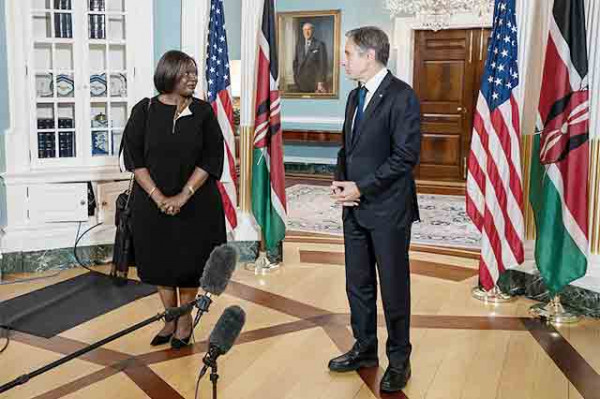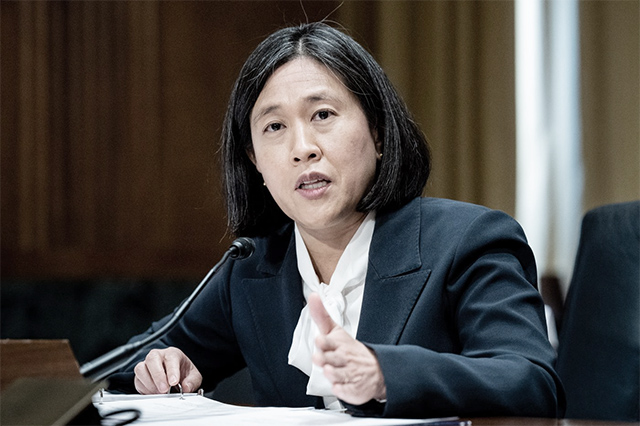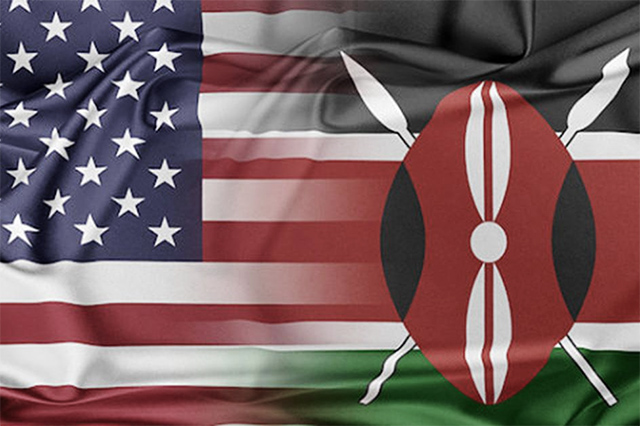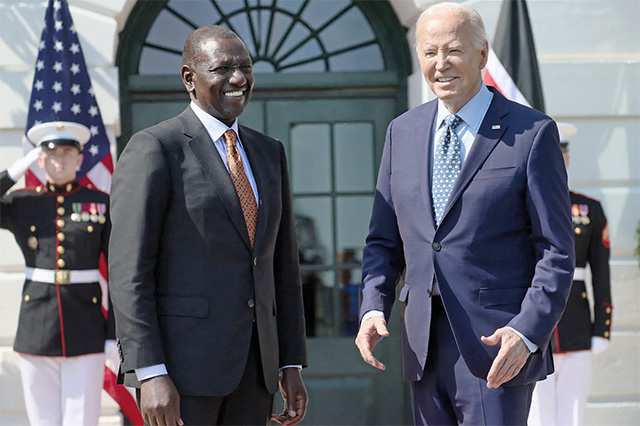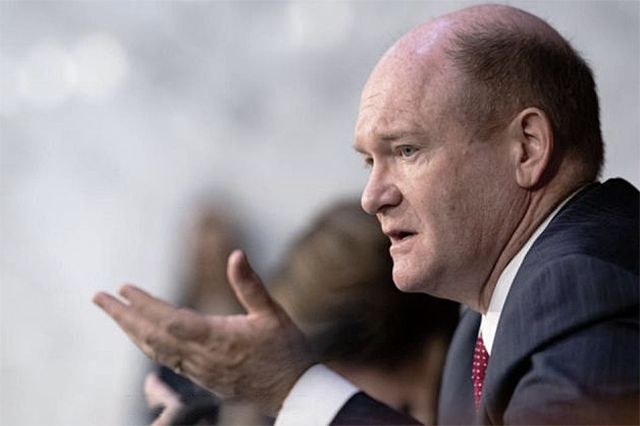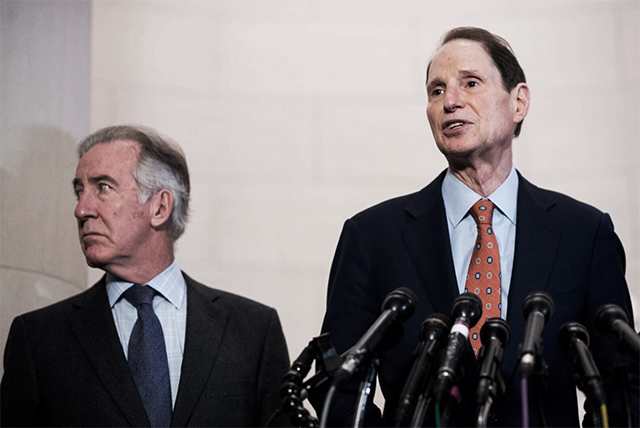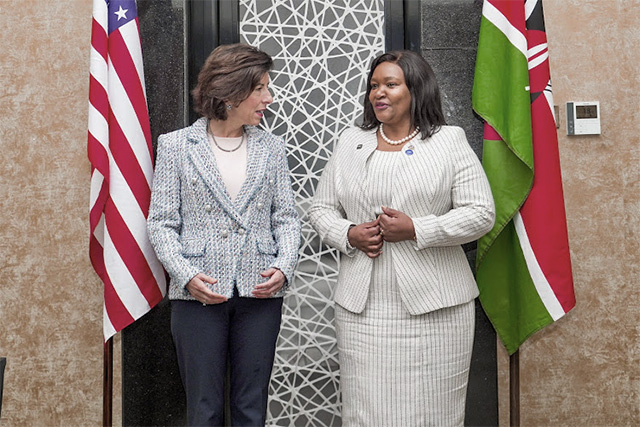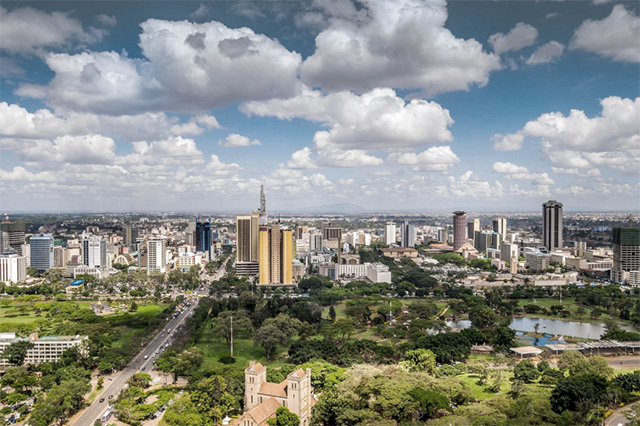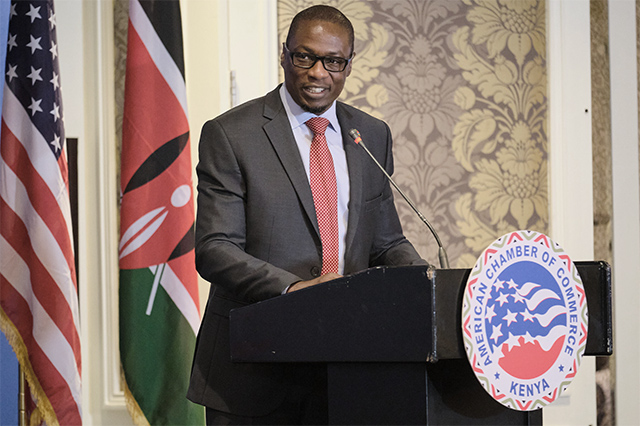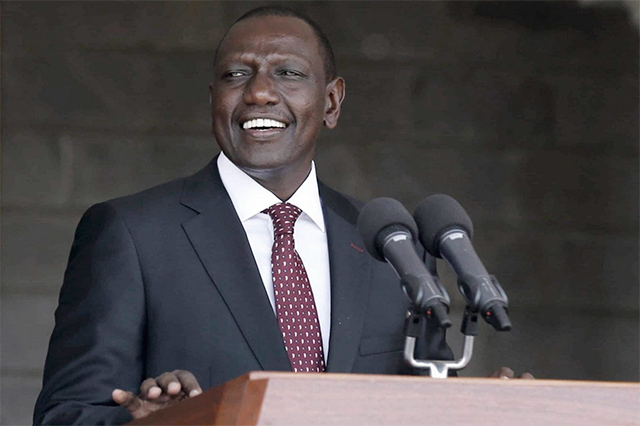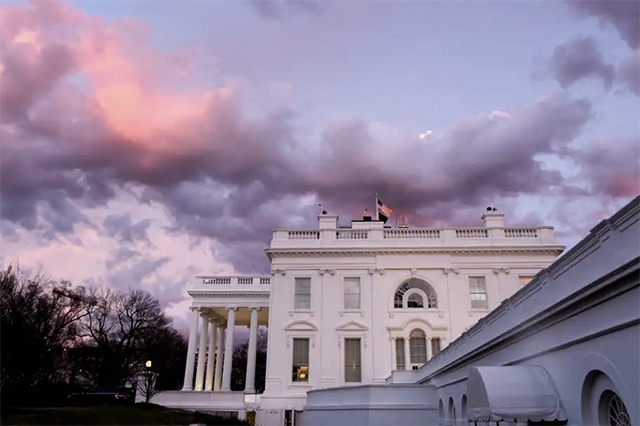Proceedings from the US-Kenya bilateral strategic dialogue
Joint Statement on the Second Kenya-U.S. Bilateral Strategic Dialogue
The Governments of the Republic of Kenya and the United States of America held the second session of the Kenya – United States Bilateral Strategic Dialogue in Nairobi on November 17, 2021.
Kenyan Cabinet Secretary for Foreign Affairs Ambassador Raychelle Omamo and U.S. Secretary of State Antony J. Blinken discussed strengthening the strategic partnership across all five pillars and advancing peace and prosperity in Africa and the western Indian Ocean region through the following actions:
Pillar One – Economic Prosperity, Trade, and Investment: The two countries committed to deepen economic ties, expand bilateral trade, and advance shared economic prosperity for the benefit of the Kenyan and American people.
To further deepen economic ties, Kenya and the United States decided to explore additional mechanisms to expand bilateral trade and investments, including through maximization of AGOA, Prosper Africa Build Together Campaign, and Power Africa, as well as joint infrastructure development through the Build Back Better World initiative.
The two countries renewed their commitment to fully implement a Millennium Challenge Corporation threshold program in Kenya and to continue to build capacity in governance and financial accountability to advance Kenya’s progress towards a future MCC Compact. On food security, they also recognized Feed the Future’s expansion of economic opportunities for smallholder farmers and entrepreneurs, strengthening of household, community and market resilience to shocks, and diversification of agricultural production.
On environment and climate change, the two sides noted the importance of environmental protection and committed to cooperate bilaterally and multilaterally in providing institutional support and building capacity for environmental conservation, climate change, food security, weather monitoring and implementation of multilateral environment agreements.
Kenya and the United States committed to enhance cooperation on university education, academic research, academic scholarship, technical and vocational training and capacity building for the Ministry of Education.
Pillar Two – Defense Cooperation: Kenya and the United States will work together on counterterrorism, border security, maritime security, and professionalization of security forces. Both sides pledged to maintain pressure on al-Shabaab and other terror groups operating in the Horn of Africa through military exercises, joint operations, provision of equipment, and security cooperation. The two countries welcomed achievements so far and affirmed the need for enhanced partnership in counterterrorism and counter-insurgency capabilities.
Both sides pledged to increase maritime security cooperation to harness the blue economy and safeguard a free, open, and prosperous Indian Ocean region, and applauded the February 8, 2021, visit of USS Hershel “Woody” Williams, an Expeditionary Mobile Base ship, marking the first U.S. naval vessel visit to the Port of Mombasa in over a decade. The United States looks forward to finalizing the bilateral Acquisition and Cross Servicing Agreement that will facilitate greater flexibility in supporting combined training and operations.
Pillar Three – Democracy, Governance, and Civilian Security: The two countries underscored their commitment to fostering accountable and effective public institutions and to addressing governance, fiscal transparency, and accountability challenges.
Kenya and the United States affirmed that free and fair elections are the foundation of a robust democracy and are paramount to the protection and advancement of human rights and individual freedoms of all people. They noted with concern the rising incidence of coups and unconstitutional changes of government, and condemned these as contrary to their values and as threats to peace and stability.
Both countries noted important progress in the joint country action plan to enhance civilian security and governance cooperation. The two countries committed to enhance cooperation in police reforms and equipment, combatting cybercrime, and administration of justice.
The two countries also committed to expand their partnership to defend against common cyber threats, and reaffirmed their mutual commitment to an open, interoperable, reliable and secure Internet and a stable cyberspace. The two countries announced their intent to hold a U.S. – Kenya Cyber Dialogue later this year.
The United States reiterated its commitment to providing border management systems and training to increase Kenya’s screening and identification of dangerous individuals while facilitating legitimate travel and trade. Kenya welcomed the start of a partnership between the Kenya Coast Guard Service and the U.S. Coast Guard and reaffirmed its interest in acquiring U.S. excess defense article vessels.
Pillar Four – Multilateral and Regional Issues: Kenya and the United States pledged to work closely on the UN Security Council and in other regional and multilateral institutions to address sources of regional instability in the Horn of Africa and elsewhere. Both countries reiterated the importance for the government of Ethiopia, the TPLF, and all armed actors involved in the violent conflict in Ethiopia, to commit to an immediate cessation of hostilities and a negotiated ceasefire, to allow full, safe, and unhindered humanitarian access to populations in need, to undertake an inclusive national dialogue, and to oppose hate speech and incitement on the basis of ethnicity, religion or regional origins.
Kenya and the United States expressed their continued commitment to countering and degrading al-Shabaab in Somalia. In particular, in line with Resolution 2607 (2021), they planned to cooperate, alongside international and regional partners, in combatting the exploitation of the licit financial system regionally by Al Shabaab and affiliates linked to ISIL. The United States expressed gratitude for Kenya’s contribution of troops to the AU Mission in Somalia.
Both countries expressed concern about the slow implementation of the Revitalised Peace Accord in South Sudan and underscored the importance of supporting the implementation of the peace agreement.
The United States and Kenya reiterated their serious concern about the military takeover in Sudan and called for the restoration of the civilian-led transitional government on the basis of the constitutional declaration and other foundational documents of the transition.
The United States expressed appreciation for Kenya’s global climate leadership, and both countries pledged to promote greater global climate ambition in support of a 1.5-degree limit. They also committed to push for achieving net zero global emissions by 2050 or before, as well as advancing urgent action on climate adaptation and resilience. The two countries affirmed the ambitious targets in their respective Nationally Determined Contribution plans and underscored the urgency of working with all countries to realize climate ambitions post COP26.
The United States commended Kenya’s hospitality and commitment to hosting refugees over decades and encouraged Kenya to maintain asylum space for people fleeing conflict. Kenya called on the United States and other partners to share the burden of hosting refugees including through financial assistance as well as by also maintaining asylum space and resettlement for refugees.
Pillar Five – Health Cooperation: Kenya expressed appreciation for the U.S. donation, in partnership with COVAX, of over four million vaccine doses to fight the COVID-19 pandemic. This is in addition to the $76 million in U.S.-provided health equipment, personal protective gear, testing (including genomic sequencing), training, surveillance, and research since the onset of the pandemic. The U.S. government has also supported Kenya’s HIV/AIDS response. The partnership has prevented millions of HIV infections and currently treats over 1.2 million HIV-positive Kenyans. As a result, Kenya is on the path to epidemic control by 2026.
Kenya and the United States are committed to continue collaborative research and development of diagnostics, vaccines, and therapeutics to detect, prevent, and treat COVID-19.
The United States will continue to support the Kenyan government to realize its goal of universal health coverage for all Kenyans and the establishment of the National Public Health Institute.
Kenya and the United States committed to continue collaboration on cancer research, evidence dissemination, and training activities that are strengthening cancer control in both countries and globally. Partnerships and consultations between the two countries will advance Kenya’s regulation of foods, drugs, medical devices, and chemicals. In collaboration with the private sector, these joint efforts will help Kenya towards its goal of manufacturing medical supplies, equipment, and vaccines.
Kenya and the United States look forward to the third Bilateral Strategic Dialogue in Washington D.C. in 2022.
Secretary Antony J. Blinken Remarks at a Roundtable with Civil Society
Sankara Hotel, Nairobi, Kenya
November 17, 2021
SECRETARY BLINKEN: Well, good morning, everyone. Wonderful to be here, my first opportunity to (inaudible) conversation here in Kenya. I’m very grateful to all of you for being able to join us this morning. I really wanted to spend the next hour or so listening to each of you, so let me just be very brief at the top.
This is an important time, not just for Kenya but around the world. We’re seeing – we’ve seen over the last decade or so what some would call the democratic recession – democracies are falling back – as opposed to (inaudible) test democracy in all sorts of ways, from inside and from outside. As we’ve seen citizens’ trust in democracy decrease, we’ve seen bad actors play up some (inaudible) that exist within democracies; independent institutions challenged and undermined; journalists, human rights activists threatened and attacked. Even vibrant democracies like Kenya are experiencing these pressures, especially around election time.
We’ve seen the same challenges here that we see in many parts of the world: misinformation, political violence, voter intimidation, voter bribery, (inaudible). And these are stories that we see in place after place. And there’s also something that chips away at democracy in country after country, and that is corruption – there’s also bias and intimidation, (inaudible). What I’m describing to you is the story in many countries around the world. Of course, the United States is hardly immune from these challenges. We’ve seen just how fragile our own democracy can be.
So the reason I wanted to get together and start the day and hear from all of you is we’re going to hear more about your experiences with these challenges and how you’re impacted, and how you’re thinking about – how you’re confronting them, and what’s most effective in strengthening our democracies, building resilience, and resisting some of the efforts to undermine. And for me, it’s important, as I said, to be listening to you because in country after country that is experiencing these challenges, people are finding different ways to strengthen their whole democracy. And no one has all the answers, but somewhere is somebody who does have the answer.
So for me, to be able to hear how (inaudible) dealing with the challenges is hugely beneficial because it’s something I can bring back with me and also share with others. And I also want to hear, to the extent it’s helpful, how the United States can be helpful. So you’re out there every single day speaking up and speaking out on behalf of your fellow citizens, monitoring electoral processes, shining a much needed light on corruption and (inaudible). And this is the difficult, day-in-day-out work: standing by democracy, upholding it, helping (inaudible). It’s what’s – what our Constitution refers to when it talks about wanting a more perfect union. The work is never fully done, even in a strong democracy (inaudible). And you’re doing this all in the face of real resistance.
So simply put, thank you for everything that you’re doing, for all of the services you’re providing to your fellow citizens. And now, as I said, I would love to hear your perspectives on how we can build not only our partnership, but (inaudible) as a democracy. With that, let me stop talking and start listening.
Secretary Antony J. Blinken and Kenyan Cabinet Secretary of Foreign Affairs Raychelle Omamo at a Joint Press Availability
Serena Hotel, Nairobi, Kenya, November 17, 2021
FOREIGN SECRETARY OMAMO: Good afternoon ladies and gentlemen, from various media houses. We are delighted to welcome you to this press conference. My name is Raychelle Omamo. I am the cabinet secretary for foreign affairs of the Republic of Kenya, and I’m delighted to be sharing this platform with my dear friend and colleague, the Secretary of State of the United States of America, His Excellency Antony Blinken. I wish to reiterate our warm words of welcome to the very strong delegation that you traveled with, Excellency, and to say how privileged and joyous it was for us to engage with you today.
Members of the press, I wish to affirm two things. First, that the United States and the Republic of Kenya have a very special relationship, a unique relationship, a relationship that dates back very many years. The whole object of this visit – and this is my second point – is to rejuvenate, is to reaffirm, is to deepen this very special relationship. And I thank you for choosing Kenya as your first port of call as you begin your maiden visit as Secretary of State to our wonderful continent. Thank you for affirming Kenya’s salience in the foreign policy of the United States and for affirming and reassuring us of the strength of this friendship.
Secretary Blinken has had a very busy day already. He has this morning held excellent talks with His Excellency President Uhuru Kenyatta on a variety of issues. We have just concluded a ministerial meeting, the second one of the U.S. Bilateral Strategic Dialogue, which I co-hosted with my colleague. We discussed a variety of issues of common concern, whether it was COVID-19 recovery, and the support that we have received from the United States of America, especially the large consignment of vaccine donations that we have recently received. And we also recalled the very, very strong relationship that the United States has with Kenya’s health sector in so many variety of areas. We discussed multilateral cooperation, especially within the context of the United Nations Security Council.
We also touched on the pressing regional issues in our region and on our continent. We looked at the ways in which we could invigorate trade and investment. We touched on peacekeeping, the huge mandate that is required on our continent. And we also touched on environment and climate issues which are very dear to the United States of America and also to Kenya. We hope that this will be the beginning of many more engagements. We’ve already had engagements by telephone, on the video – on the virtual platforms. We now have face – actually today, now it’s a mask – face to face. We’ve had mask to mask, face to face engagements, and we hope that we’ll be able to have many more of this – these engagements as we think about building back better, as we think about reshaping our relationship to contend with the challenges of the day, and affirming that when you hold hands with your brother or your sister, you can move mountains and you can walk great distances for the betterment of humanity.
I would now like to give the floor to my dear brother for you to make some comments, and then thereafter, we’ll take one or two questions from the press. I thank you.
SECRETARY BLINKEN: Thank you so much, Cabinet Secretary Omamo, Raychelle, sister. It is – it’s wonderful to be with you and thank you for what’s already been an extremely productive day. This is my first in-person trip to Kenya as Secretary of State. I’ve had the great pleasure of being here a number of times before, but I’m especially pleased to be here now. We actually did our first virtual visit to Africa earlier this year, including Kenya, but nothing beats being here in person.
General Kenyatta once said that our children may learn about the heroes of the past; our task is to make ourselves the architects of the future. That’s exactly what we’re working on. For decades, Kenya and the United States have worked together to build that future, and today, our governments are partners on virtually every critical issue we face both through our bilateral relationship but also the work we’re doing regionally and through institutions like the United Nations Security Council, where Kenya is serving a two-year term and held the presidency very productively last month.
Beyond our governments, our countries are deeply, deeply connected – business ties, partnerships between our civil societies, family and cultural ties going back generations. Tens of thousands of people in the United States very proudly claim their Kenyan heritage, including my former boss, President Obama. Before the COVID-19 pandemic, thousands of Americans traveled here every year to experience Kenya’s hospitality for themselves, and they will again. A few weeks ago, we Americans cheered for the two amazing Kenyan runners who won the marathon in my hometown, New York City, something that we often do because Kenyans win a lot.
In short, the friendship between our countries is strong, and it’s not only good for our two countries, but for the region, and I’d argue for the world, and that goes to some of the things that not only did we talk about today but that we’re working on together every day. And let me just briefly touch on a few of them.
First, on ending the COVID-19 pandemic, we are working to accelerate the global vaccine effort because – as we’ve said repeatedly and we say it repeatedly because it is fundamentally true – no country, no region will be safe until we stop the pandemic everywhere. As long as the virus is replicating, it’s likely to be mutating, and as long as it’s mutating, it may well come back and defeat some of the vaccines that are so effective and that we put in place. So we have to continue to make every possible effort to get ahead of this. That was a major theme of the COVID ministerial that we hosted last week, and I want to thank the cabinet secretary for her very strong participation in that meeting.
We’re working with the African Union, with the African CDC, with COVAX to make COVID-19 vaccines available across the continent. We’ve provided more than 50 million doses to 43 African countries to date, including, indeed, close to four million doses here in Kenya. We’ve also given more than $1.9 billion in COVID-related assistance across Africa to help meet health and humanitarian needs, including $76 million to Kenya. And we’ve done this with no political strings attached. This is about saving lives. That is the only metric that matters.
I’m here today with someone well known to many Kenyans and many friends throughout the continent, Gayle Smith, our coordinator for global COVID response and health security, to herald another step that we’re taking in the fight against COVID, and that’s something called the glovid – the Global, excuse me, COVID Corps, a new public-private partnership. What we found is the so-called last mile challenges, including delivery and logistical hurdles, can make it difficult to turn vaccines into vaccinations – in other words, actually getting shots into arms. And through this Global COVID Corps, private sector companies will work pro bono to help countries overcome these last mile obstacles. And we’re very pleased to welcome Kenya’s participation as the first country to partner with the Global COVID Corps. They’ll begin with an assessment of any gaps that are hindering vaccination efforts and then help address them, but also, critically, help build capacity here that lasts well beyond the engagement of the COVID Corps.
Second, on clean energy, Kenya is a model of investment and renewable energy which now provides 90 percent of this country’s power, and Kenya’s one of the few countries worldwide that has set a target of 100 percent renewable energy by 2030. That’s leadership, and leadership that, as I told the cabinet secretary and President Kenyatta, we like to be able to brag on around the world because it sets a powerful example. We’re very proud to partner with Kenya on these efforts.
For example, our Development Finance Corporation has facilitated nearly $600 million in investments in windfarms and other renewable projects in Kenya, and we want to do more work together in this space because clean energy infrastructure creates good jobs, it contributes to a stronger economy, and of course, it’s critical in the fight against climate change.
More broadly, we’re proud of the strong economic relationship that our countries have built, which includes about a billion dollars in annual two-way trade. And recent American private sector investments in Kenya across sectors, ranging from food processing to telecommunications, total more than $725 million, including $93 million in investments in Kenya’s small and medium-size enterprises generated through the great work of USAID.
Third, on advancing peace and security, the attack yesterday in Kampala was a painful reminder of how vital it is that we continue to work together to improve security throughout East Africa. The United States offers its deepest condolences to those injured in the attacks and to the families and loved ones of those who were killed. We’re grateful to Kenya for being our security partner. Our countries consult frequently on critical situations throughout the region.
One place where we’re both deeply concerned is Ethiopia. The conflict there threatens not just that country, but its neighbors as well. I very much appreciate President Kenyatta’s engagement on this, including at the United Nations, and in person in Ethiopia. We’re working closely with Kenya, the African Union, and its high representative for the Horn of Africa, former Nigerian President Obasanjo, as well as other partners. Our Special Envoy Jeff Feltman is working with High Representative Obasanjo to press the parties to end hostilities immediately and without preconditions, to stop human rights abuses and violations, to provide humanitarian access for the millions in Northern Ethiopia who are in dire need of life-saving supplies.
Even as we’ve taken prudent measures to reduce our personnel in Addis, our embassy remains fully engaged in these efforts and is providing support to American citizens. As we have for weeks, we continue to urge all American citizens in Ethiopia to leave the country using the best available options, and again, commercial aviation is working and is functioning normally.
Regarding Somalia, the United States is grateful here as well to Kenya for a very strong security partnership and its contributions to AMISOM as we work together to defeat al-Shabaab and other terrorist organizations. It’s vital that Somali leaders complete the national elections process as soon as possible and focus again on combating al-Shabaab and bringing greater stability to the region and to the country.
And finally on Sudan, here again we appreciate Kenya’s stance against the military takeover and its role in the African Union’s Peace and Security Council suspension of Sudan from AU activities. We support the Sudanese people who have repeatedly made clear their aspirations for democracy, and we back their call to restore Sudan’s democratic transition. We’re continuing to work with the international community to urge the Sudanese military to release all those detained with the takeover.
We’re engaging intensely with representatives from all sides. I’ve been working the phones. Molly Phee, our new assistant secretary of state for African Affairs, was in Khartoum earlier this week. Sudan had been on a path toward democracy and stability. Returning to that path is the best way for Sudan to attain peace and prosperity, become a leader on the continent, and to restore very strong support from the international community. Later today, I’ll have a chance to meet with representatives from the Intergovernmental Authority on Development, which is instrumental for promoting peace and sustainable development, to discuss all three of these urgent governance and security challenges.
Fourth, on the relationship between Kenya and the United States, earlier today the cabinet secretary and I, as she noted, completed the second Strategic Dialogue, bringing our countries together. We’re very much looking forward to hosting Kenya for our next dialogue in Washington next year. Together, we’re deepening cooperation in the five areas that we set out when the dialogue was initiated: economic prosperity, defense cooperation, governance and civilian security, multilateral and regional issues, and public health cooperation. Here again, these reflect the strength of our partnership, its depth, which fundamentally is grounded in our shared democratic values. And we’re constantly working as well to make our democracy stronger and more resilient.
I started this morning with a roundtable conversation with members of Kenya’s very dynamic civil society. In addition to being deeply impressed by the important work that they’re doing on behalf of their country, we also discussed areas and issues of serious concern, including arbitrary arrests and detentions, extrajudicial killings of activists and journalists. We want to partner with the Kenyan Government and with civil society to ensure that even while addressing legitimate security concerns, the rule of law and human rights are safeguarded. That’s how to build public trust in public institutions.
We also discussed next year’s elections. As we look ahead to 2022, it’s critical that all parties – the government, opposition parties, civil society – work together to ensure safe and stable elections that reflect the will of the Kenyan people. As we’ve seen again today, Kenya and the United States are firmly focused on building our shared future together. I’m grateful for the good work we’ve done here in Nairobi. And ultimately, what we know it comes down to is making a difference in the lives of our people, of our citizens. That is our responsibility, and everything we’re doing together has that very much in mind. And with that, thank you very much.
FOREIGN SECRETARY OMAMO: Thank you very much, Secretary Blinken. I think you can hear me better now. Thank you very much, Secretary Blinken, for your kind words and for providing an overview of the manner in which we are managing this special relationship that we have.
I would now like to open the floor to questions. I don’t know who will be managing that.
MODERATOR: Thank you very much —
FOREIGN SECRETARY OMAMO: I think we will take two questions, so please, go ahead.
MODERATOR: Yes. Thank you very much, Madam Cabinet Secretary and Secretary of State. We shall have a brief Q&A: two representatives from the local media and two from the American side. And I will begin with the Kenyan side. Catherine from Al Jazeera.
QUESTION: My name is Catherine Soi from Al Jazeera. I have a question for Secretary Blinken. You have just – and we have seen a travel advisory urging U.S. citizens to leave Ethiopia immediately. Does that show how dangerous the situation is becoming and that there is no movement forward in terms of ending hostilities?
And my other question is about pressure on the both sides. We know that the U.S. and other international partners are holding off on sanctions to allow for a dialogue, but beyond that, what more can be done to push the both sides to commit to a ceasefire and talks? They’re all still being accused of human rights atrocities. The UN and the Ethiopia Human Rights Commission have said about – up to a thousand Tigrayans have been detained by security forces. So what more can be done beyond diplomatic talk to make sure and to put pressure on these two groups to commit to a ceasefire? Thank you.
SECRETARY BLINKEN: Thank you very much. We are gravely concerned about the escalating violence, the expansion of fighting throughout the country, and what we see as a growing risk to the unity and to the integrity of the Ethiopian state. And for that reason, it’s my responsibility, our responsibility to first and foremost ensure the safety and security of American citizens, of embassy personnel, and to be cautious and to make sure that we are doing that. We have urged Americans who are in Ethiopia to take advantage of the opportunity to leave. And my strong hope and conviction is we will help move things back to a place where it will be very safe for them to return and for Ethiopia to continue to move forward. But it is the responsible, prudent, and necessary thing to do to make sure that we are looking out for our citizens and also looking out for our embassy. We instructed the embassy to reduce its staffing to essential personnel some days ago.
Now, I strongly believe that there is an opportunity – and more than an opportunity, an absolute necessity – for all of the parties to stop, to talk, to pull back, to get humanitarian assistance to flow, and ultimately to be at a table together and negotiate through the various differences that that have emerged over the past year. I spoke with Ethiopian Deputy Prime Minister and Foreign Minister Mekonnen a few days ago. I shared our deep concern over the ongoing conflict, emphasizing the urgency of taking concrete steps for peace on the part of everyone involved. I reiterated our call for all parties to urgently and seriously engage in negotiations on a cessation of hostilities without preconditions.
And I underscored the need for immediate, unhindered humanitarian access to Northern Ethiopia and in support of all Ethiopian communities in need. Because what we’ve seen is the way the conflict has progressed, more and more parts of the country have become involved and/or are in jeopardy with their citizens bearing the consequences. And whether that’s in Tigray over the last year, more recently in Amhara, and moving further south toward Addis, the people who suffer are the people, and we have to make sure that they are getting the assistance they need, and that the fighting ceases and the talking starts.
In addition to that, the conflict in Ethiopia is a threat to peace and security in the Horn of Africa, and that is of deep concern to us too and it’s of deep concern to our partners, including here in Kenya. So we’re looking for all sides, as I said, to step back. The TPLF and the OLA should halt their advance on Addis. We’d like to see the parties come together at the table to put in place a cessation of hostilities. We need to see humanitarian assistance flow freely now, we need to see people detained released, and we need to see everyone engaging in an effort to resolve the differences that exist peacefully and constitutionally.
Let me just add that we are working with a whole host of partners to advance these efforts. But most important, the representative of the African Union, former Nigerian President Obasanjo, who’s leading the mediation efforts – we’re in strong support of what he’s doing. And we are also very appreciative of the work that other partners, starting with President Kenyatta, have done to try to support President Obasanjo’s efforts, the AU’s efforts to move this forward. Bottom line is that there is no military solution to this conflict. Every party has to recognize that and act accordingly.
With regard to atrocities, we have deep concern about that, as we have over the past many months, something that we are looking at very closely, very carefully, and making determinations as we go along. Thank you.
MR PRICE: Our first question will go to John Hudson of The Washington Post.
QUESTION: Thank you, Mr. Secretary. A few questions on Ethiopia. Is Prime Minister Abiy the legitimate leader of Ethiopia? And if so, how do you view the TPLF, which seek Abiy’s overthrow? And I know you just mentioned that you’re making considerations, but can you just give us the latest on whether you view what happened in Tigray as a genocide? And if so, why stay quiet? And Cabinet Secretary, is the Kenyan Government hopeful for a ceasefire after President Kenyatta’s visit to Addis this weekend?
SECRETARY BLINKEN: Thanks, John. I’m happy to start. The second part of your question first with regard to, as I said, to the atrocities and how we would categorize them. We’re focused on the facts, and we’re focused on the law. And we will make a determination, I will make a determination, once we get all the analysis that goes into looking at the facts and looking at the law.
Regardless of that, the fact is that we have seen, we continue to see, atrocities being committed, people suffering. And regardless of what we call it, it needs to stop. And there needs to be accountability, and we’re determined that there will be.
I also said that as this moves forward, it is very important that the differences, the conflicts be resolved by people sitting down at the table, talking, discussing, negotiating. And that needs to be done, in my judgment, pursuant to the constitutional order, including with the duly elected leaders of the country – Prime Minister Abiy – but at the table with all who have grievances and concerns that unfortunately everyone – and tragically, everyone has chosen to express through military means as opposed to using the political process. It’s vitally important that everyone come back to the political process for resolving differences that exist and moving Ethiopia forward.
FOREIGN SECRETARY OMAMO: Thank you very much for your question, and I think it was as to whether or not we are hopeful for a ceasefire after President Kenyatta’s visits to Ethiopia recently.
President Kenyatta deals with this issue as a friend and as a neighbor of Ethiopia. And friends and neighbors believe in the potential of their neighbor. We believe in the potential of Ethiopia to find a resolution to this crisis. We believe that a ceasefire is possible. We believe that the other conditions regarding humanitarian access are possible.
We must believe in the fortitude and the wisdom of the Ethiopian people, because in the end the solutions will come from them. What we must do as neighbors is to support, is to counsel, is to hold hands, is to point in the right direction, to ensure that this crisis, when it ends – and we believe it will end – will leave Ethiopia a stronger nation, will leave Ethiopia a stronger partner and a country that is able once again to guarantee the peace in our region.
Let us not give up hope in the people of Ethiopia. We must remain steadfast in being positive and being engaged in this crisis. I thank you.
QUESTION: Thank you very much. My name is Aggrey Mutambo, Nation Media Group. My first question goes to both secretaries. I just wanted to know how you intend to elevate the issues of climate change and environmental conservation within your strategic partnerships. And then I wanted to know specifically for you, Secretary of State: What role do you think Kenya should play in the Ethiopian crisis? Thank you.
SECRETARY BLINKEN: Raychelle, would you like to start?
FOREIGN SECRETARY OMAMO: The first question was how do we propose to integrate climate change into our foreign policy?
QUESTION: Through strategic partnership with the U.S., yes.
FOREIGN SECRETARY OMAMO: Into our strategic partnership with the U.S. Well, I think the U.S. and Kenya believe in the same values, in this idea that we all have to engage as a collective to bring down emissions and to facilitate adaptation. We have already worked together at COP26 on these issues. We have worked together on conferences that have been called by President Biden on this. And we will continue to partner in looking at investments in the area of green industries, in the area of energy.
We want to work together to facilitate adaptation measures that will help build resilience in our communities. We want to ensure that working with the United States, we are able to unlock the climate financing gap and to create new products that will enable countries like us who are in the third world, who are least responsible for global warming, shore up our resilience and our ability to transform our own economies from the green transition.
We must work together on the issue of climate change and its connection with security, its connection with agriculture, its connection with innovation, and its connection with building a body politic of Kenyans and Americans who are interested in preserving our planet. In our discussions this afternoon, we were able to identify just a few of the possibilities that are available to us. We must, however, be a little bit more strategic and ensure that we identify those programs, those initiatives that will have the biggest impact not only for our relationship but for our respective people and for this planet that we love. I thank you.
SECRETARY BLINKEN: Well, I really couldn’t say it any better. Just to quickly add, as I said earlier, we are deeply appreciative of Kenya’s leadership when it comes to climate. And what Kenya has done particularly in leading on renewables is important not just for Kenya and for Kenyans, it is setting a powerful example for the world, and something that we point to regularly as we’re engaging other countries on climate change.
It is, to your point though, very much – and as the secretary said – very much a part of our partnership, and in these ways: First, and more broadly, we recognize that as a prosperous country that also has contributed over the years to much of the problem, that we have with other countries similarly situated a special obligation to help other countries build resilience and adapt. President Biden this spring doubled the commitment that we’re making to resilience and adaptation for countries that need assistance, and then he doubled that again at the UN General Assembly. And we’re working with Congress to make sure that those funds are available.
Coming out of COP26, we also helped lead the way to working to ensure that countries move even further when it comes to supporting adaptation and resilience for countries that need assistance, and we’re going to be working on that.
In the context of our own partnership, besides working together in these important international meetings and moments, we’re also working directly together in ways that bring together different goals that we have, because they’re complementary. And so for example, as we’re working to build back better from COVID and advance inclusive growth that benefits our people, one way to do that is to invest in green technology and in sustainable infrastructure. And that also meets the needs that we have for advancing the fight against climate change.
So as the cabinet secretary said, we’re very focused on initiatives between the United States and Kenya where we can engage in those kind of projects together, where we can make those kinds of investments. And that’s something that we have a mandate now to look at very carefully.
We have a number of different tools in the United States to help advance those kinds of investments, including the Development Finance Corporation and others. We’re trying to bring to bear all of these tools on – working with partners, starting with close partners like Kenya – on making these kinds of investments going forward. They’ll have economic benefits, good jobs, good wages, and they’ll have clear climate benefits. And we’ll continue together, as we’re working bilaterally, to also coordinate our efforts when it comes to helping other – urging other countries to continue to raise their ambitions and to meet the goal that we share, which is making sure that temperatures don’t rise more than 1.5 degrees Celsius. Because if we’re not able to achieve that goal, then the world has a very, very big problem.
MR PRICE: Final question. We’ll go to Michael Crowley, The New York Times.
QUESTION: Hello. Thank you both. Secretary Blinken, in Sudan, despite the diplomacy you mentioned at the top of your remarks to reinstate Prime Minister Hamdok, the country’s army chief last week appointed himself the head of a new ruling council. Does the U.S. accept the authority of that council? And if not, what is your next move for pressuring the military to back down or at least to stop shooting protesters?
For both of you, a question on the bombings in Kampala yesterday. Cabinet secretary, are you worried that Islamic extremist groups in the region may be growing stronger? And do you believe current U.S. counterterrorism efforts are adequate? And Secretary Blinken, could you update us on the status of the administration’s Somalia policy review? Following President Trump’s withdrawal of U.S. counterterrorism troops there, will U.S. troops be returning to the country? Thank you both.
SECRETARY BLINKEN: Michael, thank you very much. On Sudan, the most important thing now is for the civilian-led transition to resume, and that means that this civilian-led transition, which was derailed by the military takeover a few weeks ago, needs to be put back on its tracks. And that, among other things, involves restoring Prime Minister Hamdok to his position as Prime Minister so that this transition led by civilians in cooperation with the military can continue, and also can continue to receive the strong international support, including from the United States and international financial institutions.
People of Sudan have repeatedly made clear their aspirations for democracy, their aspirations for this transition to continue. So this is what they want. This is what the international community supports. We’re working with partners in the international community to urge the Sudanese military to release all of those who have been detained in recent weeks in connection with the takeover, and for the return of the civilian-led transitional government as stated in the constitutional declaration. We’re also very much engaged with all the parties to try to put that that train back on its tracks. Our Assistant Secretary of State for African Affairs Molly Phee was just in Khartoum a couple of days ago. She met with Prime Minister Hamdok, among others. We’ll continue to remain deeply engaged in support of the aspirations of the Sudanese people. And I’ll say again about Prime Minister Hamdok – he is a source of legitimacy and it’s vital that the transition regain the legitimacy that it had before the civilian-led effort was derailed.
But if the – if the military puts this train back on its tracks and does what’s necessary, I think the support that has been very strong from the international community can resume. That support has largely been suspended and Sudan needs it. The people of Sudan need it. Those responsible for Sudan need it. And so I think the international community not only has a strong voice, but significant leverage in again seeing a return to the civilian-led transition.
QUESTION: Could you please — you didn’t answer my question.
SECRETARY BLINKEN: I’m sorry?
QUESTION: I had asked another question which you didn’t answer.
SECRETARY BLINKEN: Oh, I’m sorry. Would you remind me what it was?
QUESTION: What do you think the role of Kenya in this Ethiopia crisis?
SECRETARY BLINKEN: Ah.
QUESTION: What is the U.S. view of Kenya’s role?
SECRETARY BLINKEN: I see. I’m sorry. I apologize for missing that. I think the cabinet secretary said it very, very well. I will – I’ll just add that we very much appreciate the efforts that President Kenyatta has made personally to engage and to support the efforts that are being led by the AU’s mediator, former President Obasanjo. We very much applaud President Kenyatta’s engagement on this. And I’m sorry, over to you.
FOREIGN SECRETARY OMAMO: Thank you. The question was about the bombings in Kampala. First, let me convey our deepest condolences to all those who perished in that attack and wish quick recovery to those who were injured. But even as we condemn the attack in Kampala, we must remember that a few days before, there was an attack in the United Kingdom of a similar kind. What it tells us is that terrorism is a problem for all of us, and the requirement is one of constant vigilance by all. It is necessary that we continue to collaborate and share intelligence, share best practices so that, as a world, we are able to tackle this problem together, we must also strengthen our communities to be able to detect terrorists and to report them.
We mustn’t sit on our laurels, because if we do then we give terrorists space to advance their evil agenda. What we must do is to work with partners, and I’m glad that we have been working with the United States and other partners on improving our counterterrorism structures, improving our counterterrorism skills, improving our counter-violent-extremism programs. That’s what we must do. And we must look at this threat not only insofar as it affects African countries, but in the way in which it is networked and affects the entire globe. I thank you.
SECRETARY BLINKEN: And Michael, with regard to the question of U.S. forces and Somalia, to your point, the Defense Department in the first instance, and the administration more broadly, are engaged in a global posture review. That’s not yet complete so I’m not going to get ahead of it. But that’s in train. Thanks.
FOREIGN SECRETARY OMAMO: Well, I thank you all for your kind attention. And we now bring this press conference to an end. Thank you all very much.
SECRETARY BLINKEN: Thank you.
FOREIGN SECRETARY OMAMO: And thank you, my brother.
SECRETARY BLINKEN: Thank you.


